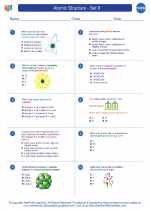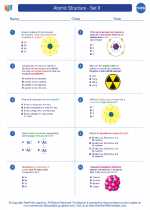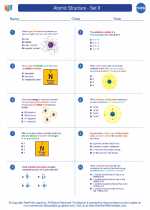Nuclear Reactions
A nuclear reaction is a process in which the nucleus of an atom is altered by the addition or removal of protons, neutrons, or both. These reactions can release a tremendous amount of energy and are the basis for nuclear power and nuclear weapons.
Types of Nuclear Reactions
There are several types of nuclear reactions:
- Nuclear Fission: In nuclear fission, a heavy nucleus, such as uranium-235 or plutonium-239, is bombarded with neutrons, resulting in the splitting of the nucleus into two smaller nuclei, along with the release of a large amount of energy and additional neutrons.
- Nuclear Fusion: Nuclear fusion involves the combination of two light nuclei to form a heavier nucleus. This process powers the sun and other stars and has the potential for energy production on Earth.
- Radioactive Decay: Radioactive decay is the spontaneous disintegration of an unstable atomic nucleus, resulting in the emission of radiation, such as alpha or beta particles, or gamma rays.
Equations for Nuclear Reactions
Nuclear reactions are often represented using nuclear equations, which show the identities of the reactants and products, as well as the particles emitted or absorbed during the reaction. These equations are balanced to conserve the total number of protons and neutrons.
Energy Release in Nuclear Reactions
The energy released in nuclear reactions is governed by Einstein's famous equation, E=mc^2, where E is the energy released, m is the mass defect (the difference in mass between the reactants and products), and c is the speed of light. This equation shows that a small amount of mass is converted into a large amount of energy during nuclear reactions.
Applications of Nuclear Reactions
Nuclear reactions have numerous important applications, including electricity generation in nuclear power plants, medical imaging and cancer treatment using radioactive isotopes, and the production of materials for industry and research.
Study Guide
To study nuclear reactions effectively, consider the following tips:
- Understand the differences between nuclear fission and nuclear fusion, including the key reactions involved and the conditions required for these processes to occur.
- Learn to balance nuclear equations and understand the concept of mass defect in nuclear reactions.
- Explore the practical applications of nuclear reactions in various fields, such as energy production, medicine, and research.
- Practice solving problems related to energy release in nuclear reactions and understand the significance of Einstein's mass-energy equivalence.
◂Chemistry Worksheets and Study Guides High School. Atomic Structure - Set II

 Worksheet/Answer key
Worksheet/Answer key
 Worksheet/Answer key
Worksheet/Answer key
